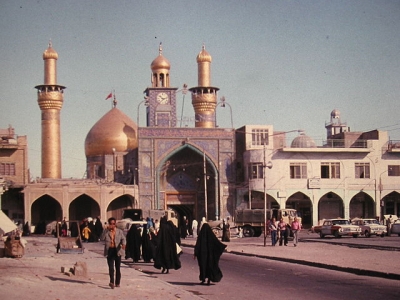Irak
En Irak, les ambassades et les consulats étrangers favorisent l'octroi de visas d’asile aux chrétiens irakiens. Un phénomène dénoncé par le patriarche de l’Église chaldéenne Mgr Louis Raphaël Sako. L’octroi de visas d’asile aux chrétiens irakiens par les chancelleries occidentales met en danger l’équilibre, déjà fragile, des communautés chrétiennes du Moyen Orient selon lui — Les ambassades étrangères favorisent l'exil des chrétiens d'Orient, dénonce le patriarche de l'Église chaldéenne (Radio Vatican)
Baha'i Faith
Birth Of Baha’u’llah 2013 : 5 Facts To Know About The Baha’i Holiday. The Baha'i faith is the youngest of the world’s independent monotheistic religions. Founded in Iran in 1844, it now has more than five million adherents in 236 countries and territories. Baha'is come from nearly every national, ethnic and religious background, making the Baha'i faith the second-most-widespread religion in the world. Baha’is celebrate the anniversary of the birth of Baha’u’llah (born Mirza Husayn-‘Ali) on Nov. 12, 1817, in Tehran, Persia (now Iran) (Huffington Post)
Atheism
Atheist ‘Megachurches’ Crop Up Around The World. Dozens of gatherings dubbed "atheist mega-churches" by supporters and detractors are springing up around the U.S. after finding success in Great Britain earlier this year. The movement fueled by social media and spearheaded by two prominent British comedians is no joke. On Sunday, the inaugural Sunday Assembly in Los Angeles attracted more than 400 attendees, all bound by their belief in non-belief. Similar gatherings in San Diego, Nashville, New York and other U.S. cities have drawn hundreds of atheists seeking the camaraderie of a congregation without religion or ritual (Gillian Flaccus, Associated Press/Huffington Post)
Laïcité
Ethique et crémation : réflexions sur une liberté éclairée. Reportage sur le colloque organisé à Nancy le 25 octobre 2013, par l’Université de Lorraine et l’Union crématiste européenne (Centre laïque de l'Audiovisuel)
Antisémitisme
Es ist eine der umfangreichsten Untersuchungen zum jüdischen Alltag in Europa: Die EU-Agentur für Grundrechte hat rund 6000 Juden in acht Mitgliedstaaten zu ihren Erfahrungen mit Antisemitismus befragt - vor allem in Deutschland gab es viele erschreckende Antworten — Europaweite Studie: Juden in Deutschland fürchten wachsenden Antisemitismus (Barbara Hans, Der Spiegel)

